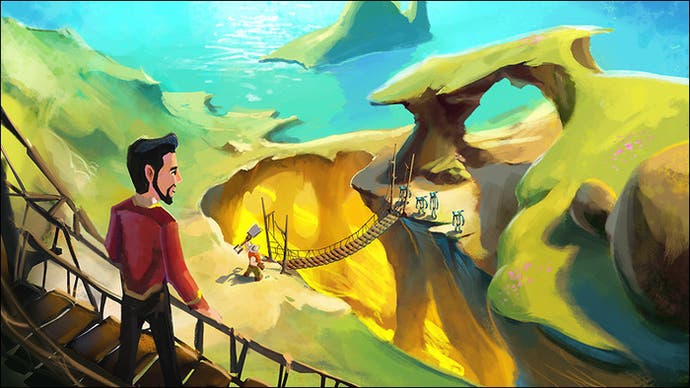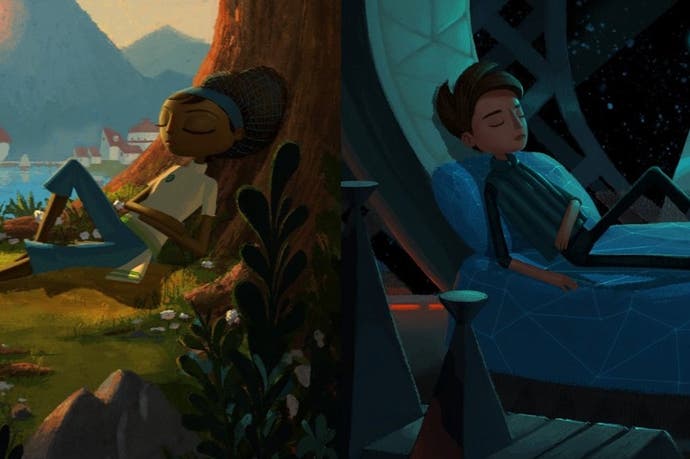When too much is not enough
Crowdfunding has freed developers from old production models, but at what cost?
Kickstarter is back in the headlines again, and for all the wrong reasons. Yogventures has fallen to pieces, taking developer Winterkewl with it and leaving a trail of passive aggressive recriminations in its wake. Meanwhile, nobody knows what the hell is going on with Areal, which has just had its successful Kickstarter cancelled and has launched another campaign. Vladimir Putin may be involved. It's very dark and confusing.
As always with Kickstarer controversies, it's easy to throw up your hands and cry foul at the whole concept. I certainly have my misgivings, but that hasn't stopped me backing over 60 projects. The idea of crowdfunding is still great, in theory, but the execution is harder than it seems. Dig beneath the juicy headlines and it soon becomes clear that the worst case scenario for some developers isn't a failed campaign but one that is wildly successful.

It's here that the notion of stretch goals comes into play, and it's this that I feel catches unprepared developers out. Again, the theory is sound: for set targets above and beyond the desired amount, additional features can be added. It should be a way of carefully portioning out the game design, only adding things once they can be afforded. When managed well, it's an excellent tool. When managed badly, it turns game development upside-down. Rather than starting out with a clear idea of what the game will entail, developers instead find themselves on a treadmill of constantly shifting expectations and design documents that keep expanding.
Just look at the most successful crowdfunding campaign of all: Cloud Imperium's Star Citizen, currently at $48m in funding and rising. Rather than raising the required amount and going off to make the game, the campaign has continued, swelling the coffers but requiring a steady stream of new stretch goals to justify the fundraising. The result is a vocal and agitated section of the backer community that would very much like to see more playable code, yet are instead faced with promises of ever more additional peripheral features. The latest: real alien languages, developed by linguistic experts.
Tim Schafer, whose Double Fine Adventure (later renamed Broken Age) kickstarted the Kickstarter revolution, offered a cogent capsule version of the problem when interviewed for Eurogamer last year. "When we got all that extra money, it didn't seem right to just pocket it," he said. "We wanted to put it all into the game." Broken Age, as we now know, ended up needing ever more money and was chopped in half for release, with the first act released in January 2014 and the second half due at some unspecified point in the future. Schafer, understandably, felt that having raised millions he couldn't then simply deliver a game costing a few hundred thousand.

In some ways, it's an honourable reaction, yet you only have to flip the scenario to see how bizarre it really is when applied across the wider crowdfunding landscape. If you developed a game for $400,000 and then earned $3.4m in sales, you'd be rightly thrilled. Yet because crowdfunding must legally be distinct from pre-ordering, when the millions come in before the product is even made it seems kind of gross to spend the minimum and cream off the rest as pure profit, even if you're still delivering the product you promised. Stretch goals offer a solution, a way of framing all that extra dough as a benefit to the player, via more stuff in the game, rather than a windfall for the developer.
In this sense, stretch goals risk becoming the indie equivalent of the bloaty feature creep that infests the AAA publisher-led end of the market. You'd be silly to turn down more money, but there's a pressure to keep cramming more and more things into a game to make customers feel like they have their money's worth, even if the things in question are unnecessary and tug the game away from its core ideas. The goalposts are always moving, nudged about by questions of financing and good community relations rather than design need.
There's even an existing management term for something very similar: Brook's Law. This was suggested way back in 1975 by software engineer Fred Brooks in his book, The Mythical Man-Month. According to Brooks, when a project is over-running, adding more manpower actually slows it down further, complicating the process. The idea that as money piles in at one end, you can keep expanding the product in development at the other is fraught with problems. It leads to a culture of making things up as you go, and completion becomes a Sisyphean task always just out of reach.
The draconian answer would be to simply remove the idea of stretch goals and know when to say "enough". But what company would ever turn down hundreds of thousands, or even millions, in what are essentially obligation-free donations? In the current climate, it would be a bold developer that said "Thanks, we've got what we need, we'll be back when we've finished the game."

I'm not about to blame the idea of stretch goals for the collapse of Yogventures or the bizarre saga of Areal, but it seems that the culture that stretch goals represent is a notable part of each story. Based on what's been revealed over the last week, Winterkewl was probably always going to be in over its head regardless of how much Yogventures earned. Yet if it had earned just the $250k originally requested rather than almost $600k, I can't help feeling that maybe the inexperienced team would have been more frugal in its spending, and the game design would have been more realistically modest.
Similarly, in amongst the curious factors blighting West Games and Areal is the fact they were asking for just $50k to develop what is clearly an enormous game. I've spoken to more than one developer who says that the current popular thinking where crowdfunding is concerned is to set a low goal that can be fairly easily achieved, and then rely on stretch goals to reach the amount you really need, adding stuff to the design document to justify it. We'll probably never know if that was West Games intention, in amongst the letters from Putin and comment thread intrigue, but it represents a fundamental inversion of common sense design. Rather than aiming at a specific target in the distance, you move the target closer and base everything around how far you can overshoot it.
For some developers, and for some games, this open-ended approach can be fine. It requires stringent organisation and efficiency, and a game design flexible enough to grow organically, making sensible use of each new funding milestone. I'm confident that Chris Roberts knows what he's doing with Star Citizen, but that won't stop skeptical backers from wondering why more and more things are being bolted on before the game is in their hands.
For too many developers, particularly inexperienced ones most likely to use Kickstarter, the subtle shift to a stretch goal oriented way of working is potentially disastrous. The obligation to keep raising more cash in order to spend more so you can add more to a game in order to justify raising more money is a vicious circle that is a little too much like the mindless bloat of the big blockbuster franchises. There are seminars galore helping developers find new ways to raise more money from the community. Knowing when to say "enough" is just as important.

